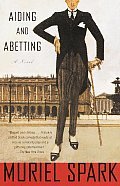 I finished Muriel Spark’s novel Aiding and Abetting recently. I’m reading it for the Slaves of Golconda; they are discussing The Prime of Miss Jean Brodie at the end of June and each of the members is reading one other Spark book, so this was mine. I figured I could post about it now and add my thoughts on the book during the larger discussion, if they are relevant.
I finished Muriel Spark’s novel Aiding and Abetting recently. I’m reading it for the Slaves of Golconda; they are discussing The Prime of Miss Jean Brodie at the end of June and each of the members is reading one other Spark book, so this was mine. I figured I could post about it now and add my thoughts on the book during the larger discussion, if they are relevant.
This is a very short book – almost short enough to be a novella – at 165 pages with large print and margins. But so much happens in it, and Spark manages to give you lots of characters and action without creating the feeling that things are rushed and undeveloped.
How can you not like a main character with the name Hildegard Wolf? She is a wonderful character: smart, powerful, mysterious. And also deceitful. She is a psychiatrist with some unusual methods: she spends the first few sessions telling stories to the patient instead of the other way around. The patients love this, for the most part, and she is very successful. She has always had healing powers. In an earlier episode in her life she was a fake “holy stigmatic”; every month she would take menstrual blood and smear it on at least one of the places Jesus was wounded, hands, feet, or side, and people flocked to her for healing. People sent her money in return for her “miracles,” and this is how she survives until she is exposed as a fraud and has to flee. This, of course, makes one wonder about the legitimacy of her status as psychiatrist. She insists that she really did heal some people as a stigmatic, and she really does seem to help her patients, so the book becomes a meditation on the power of belief. Is she so bad for having helped people, even if she did so under false pretenses? All this, by the way, is backstory, sketched in early on before the action begins.
The other part of the story involves two men, both Hildegard’s patients, each of whom claims to be “Lucky Lucan,” an Earl who killed his daughter’s nanny in a failed attempt to kill his wife and then went into hiding for over 25 years. Hildegard, with the help of some of the novel’s other characters, tries to figure out which one is the murderer while keeping out of danger herself. This part of story touches on issues of class: at the time Lucan committed the murder, the story as people told it was mostly about Lucan himself – it was a shocking tale of upper-class “bad behavior” and the friends who aided and abetted his escape. The nanny herself, the victim, was forgotten. As time goes on, Lucan’s high-class friends begin to realize that Lucan is a murderer, not just an Earl who had string of bad luck. They lose their sense of privilege and Lucan begins to lose his friends.
The novel is a mystery story in a number of senses. Which patient is the real Lucan and which is the pretender? Or are they both fakes? How has Lucan survived all those years without getting caught? What is it about Hildegard that people respond to so strongly so that she can perform miracles when they believe in her? Is she, as a fake stigmatic, so different from the fake Lucan? Here is what the novel says about mystery:The case of the seventh Earl is only secondarily one of an evasion of justice, it is primarily that of a mystery. And it is not only the questions of how did he get away, where did he go, how has he been living, is he in fact alive? The mystery is even more in the question of what was he like, how did he feel, what went on his mind that led him to believe he could get away with his plan? What detective stories has he been reading? What dreamlike, immature culture was he influenced by?
Isn’t that the real mystery – what people are like, what they experience, and what shapes them?
The writing here is simple and direct. It’s as though Spark knows she has a complicated story to tell in a limited space and so she must be efficient in her storytelling. The plot moves fast, the words do their job quickly, and yet somehow Spark manages to convey a completeness in those few words. She conjures up an entire world with just a few strokes.
I am now eager to see what The Prime of Miss Jean Brodie is like, and if it is at all similar to this one. Come back for that post on June 30!
Friday, June 09, 2006
Muriel Spark's Aiding and Abetting
Posted by
Rebecca H.
at
7:22 AM
![]()
Subscribe to:
Comment Feed (RSS)



|